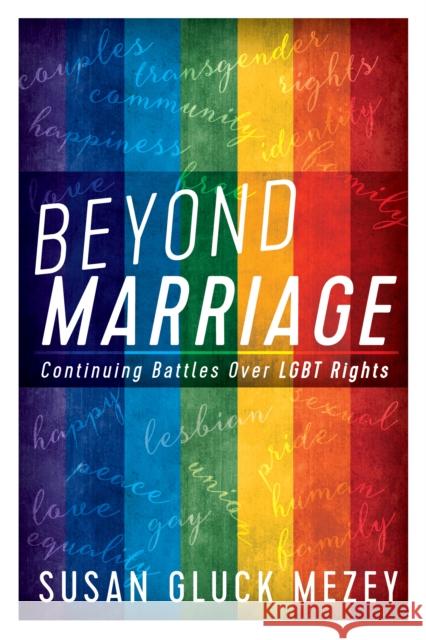Beyond Marriage: Continuing Battles for Lgbt Rights » książka
Beyond Marriage: Continuing Battles for Lgbt Rights
ISBN-13: 9781442248625 / Angielski / Twarda / 2017 / 320 str.
Beyond Marriage: Continuing Battles for Lgbt Rights
ISBN-13: 9781442248625 / Angielski / Twarda / 2017 / 320 str.
(netto: 394,06 VAT: 5%)
Najniższa cena z 30 dni: 406,38
ok. 22 dni roboczych.
Darmowa dostawa!
In the five years since Susan Mezey's last book on gay rights was published, much has changed in the public policymaking arena affecting the LGBT community. Some of the most dramatic changes have been President Obama's announcement of support for same-sex marriage in 2011, the passage of the "Don't Ask, Don't Tell Repeal Act of 2010" and the final termination of the policy in 2011, the increasing number of openly gay politicians holding federal and state offices, with the first lesbian Senator Tammy Baldwin elected in 2012, the U.S. Supreme Court's historic ruling striking the Defense of Marriage Act in 2013, the decision by the Boy Scouts of America to reverse its policy on excluding gay scouts in 2013, and the debate over religious beliefs and claims of discrimination by private actors, illustrated by the furor over Arizona's proposed Religious Freedom Restoration Act (SB 1062), which would have given business owners the right to refuse service to anyone based on their religious beliefs. This book not only builds upon Susan Mezey's previous work on gay rights in America: Queers in Court and Gay Rights and the Courts, with new material examining the ongoing battles over the rights of the LGBT community, but also examines the political and legal debates over sexual orientation and gender identity and the roles played by the federal and state courts, Congress, state and local legislative bodies, and the state and federal executive branches in formulating and implementing public policy. The book focuses on policymaking by national and subnational courts, and includes analysis of relevant legislative policymaking and executive actions, both of which are neatly woven into an accessible narrative. Suitable as a supplementary text in upper level classes focusing on judicial politics, public policymaking, family law, civil rights, gender policy, and minority group politics, this book makes a much needed contribution to the study of gay rights in America, and will help students better understand ways forward for the LGBT community in the political realm.











